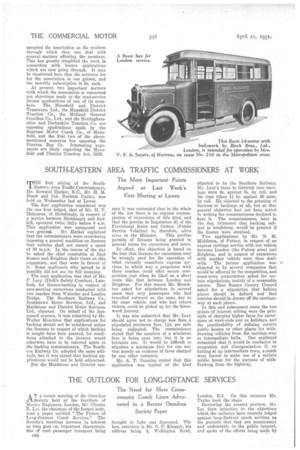SOUTH-EASTERN AREA TRAFFIC COMMISSIONERS AT WORK
Page 66

If you've noticed an error in this article please click here to report it so we can fix it.
The More Important Points Argued at Last Week's First Meeting at Lewes THE first sitting of the SouthEastern Area Traffic Commissioners, Mr. Rowand Harker, KG., Mr. H. M. Black and Col. Bonham Carter, was held on Wednesday last at Lewes.
The first application considered was the one first lodged, that of Mr. H. T. Molyneux, of Bletcbingly, in respect of a service between Bletchingly and Redhill, operated twice daily before 9 a.m. This application, was unopposed and was granted. Mr. Harker explained that the commissioners were considering imposing a general condition on licences that vehicles shall not exceed a speed of 30 m.p.h. In the course of the day he asked the chief constables of East Sussex and Brighton their views on this suggestion, and they were in favour of it. Some applicants who agreed to it possibly did not sea its full meaning.
The next application was that of Mr. P. Levy (Dick's Safety Coaches), Lambeth, for licence-backing in respect of race-meeting excursions conducted with two coaches from Waterloo and London Bridge. The Southern Railway Co., Southdown Motor Services, Ltd., and Maidstone and District Motor Services, Ltd., objected. On behalf of the lastnamed concern, it was submitted by Mr. Walter Monckton that applications for backing should not be considered unless the licences in respect of which backing is sought have been granted, for conditions attached to the licences would otherwise have to be referred again to the backing commissioners. The Southern Railway Co. adopted the same attitude, but it was stated that backing applieations would not be held adjourned.
For the Maidstone and District con cern it was contended that in the whole of the Act there is no express contemplation of excursions of this kind, andthat the proviso to Regulation 41. of the Provisional Rules and Orders (Public Service Vehicles) is, therefore, uttra vires to the Minister. This proviso permits of licences being granted in general terms for excursions and tours.
Dr effect, this objection is based on the fear that licences for excursions may be wrongly used for the • operation of what virtually constitute express services, in which way a proprietor with three coaches could offer severe ,cornpetition just when he liked on a short route like that between London and Brighton. For this reason Mr. Monckton asked for stipulations in several cases that only passengers who had travelled outward on the same day in the same vehicle, and who had return tickets, could be picked up for the homeward journey.
It was also submitted that Mr. Levy should agree not to charge less than a stipulated minimum fare, lid. per mile being suggested. The commissioner stated that the question of a minimum fare is being gone into, but it is an intricate one. It would be difficult to stipulate a minimum fare for one service merely on evidence of fares charged by one other company.
Mr. A. T. Denning stated that this application was typical of the kind objected to by the Southern Railway. Mr. Levy's fares to Gatwick race meetings were 4s. against 6s, by rail, and the time taken 1 hr. against 40 wins. by rail. He objected to the granting of licences or backings at all, but as that general objection had not been stated in writing the commissioners declined to hear it The commissioners, later in the day, intimated that backing, subject to conditions, would be granted if the licence were obtained.
Two applications by Mr. N. M. Middleton, of Putney, in respect of an express carriage service with one vehicle between London (the Putney area) and Brighton, and in respect of excursions with another vehicle were then dealt with. The former application was objected to by several companies that would be affected by the competition, and coast-town corporations asked for certain stipulations, mainly of a reasonable nature. East Sussex County Council asked for a stipulation that halting Places should be defined and that vehicles should be drawn off the carriageway at such places.
. In this and subsequent cases the two points of interest arising were the principle of charging higher fares for excursions at week-ends and on holidays, and the practicability of defining certain public houses or other places for withdrawing vehicles from the carriage-way at intermediate halts. One applicant submitted that it would be conducive to congestion and disorganization if, on halting at an intermediate town, a coach were forced to make use of a certain public house for the purpose of withdrawing from the highway.












































































































